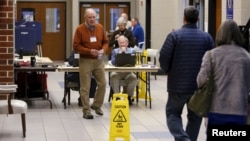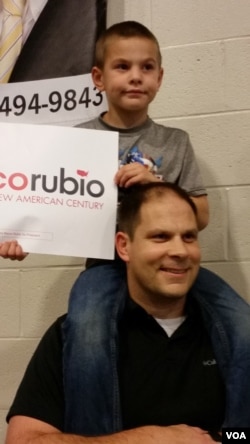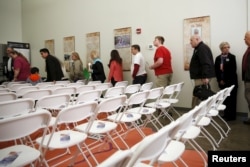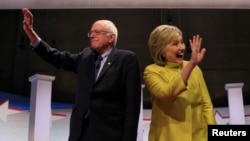Voters in two diverse U.S. states are expected to further clarify the races in the Democratic and Republican fields Saturday as the quest for the White House intensifies.
South Carolina is having a Republican primary while Nevada holds a Democratic caucus.
Ahead of the South Carolina primary, comments by Republican Party front-runner Donald Trump and Pope Francis about building a border wall between Mexico and the United States have ignited controversy.
On a flight to Rome following a trip this week to Mexico, the pope, responding to a reporter's question, said a person who thinks about building walls and “not building bridges, is not a Christian.”
Trump has called for a border wall to be built between the two countries.
In response to the pope's remarks, Trump initially called them "disgraceful," but said later during a nationally televised town hall Thursday that he has a lot of respect for Francis, and that the pope may have been given the "wrong information" about the border plan.
Republican presidential candidates joining Trump for the town hall downplayed the controversy. Ohio Governor John Kasich declined to criticize the pope for his comments, while former Florida Governor Jeb Bush said he did not think it was appropriate to question Trump’s faith.
“He knows what his faith is,” Bush said.
Trump leads among Republicans
Trump was also challenged by town hall moderators for his 2002 comments that appeared to support the U.S. invasion of Iraq. He noted that by the time hostilities started in 2003, “I was against the war.”
Trump continues to hold a commanding lead among Republican voters nationwide.
A Quinnipiac University poll found this week that Trump leads his nearest competitor, Florida Senator Marco Rubio, 39 percent to 19 percent, closely followed by Texas Senator Ted Cruz with 18 percent.
Senators Cruz and Rubio did not appear on the town hall but battled with each other Thursday over allegations the Cruz campaign doctored a photograph to make it appear as if Rubio and President Barack Obama were shaking hands.
Rubio told reporters at a campaign stop in Anderson, South Carolina, that the picture was a “fake” and represented a “disturbing pattern” from the Cruz campaign.
The Cruz campaign did not dispute the allegations but did post another photograph of Rubio and Obama on social media.
South Carolina's popular governor, Nikki Haley, who officially endorsed Rubio on Wednesday, introduced him at a rally Friday in North Charleston by pointedly saying she'd sought a candidate with passion, principles and humility. She also said she wanted to back someone who would make her India-born "parents look back and say, 'Yes, moving to America was the best thing we could have done for our children.'"
Rubio told hundreds of enthusiasts, including those holding babies and young children, this could be the first generation of Americans "to leave our children worse off" than before. The key is to dislodge Democratic control of the White House, he said.
"If we lose, all the damage Barack Obama has done to America becomes permanent," Rubio said, accusing the administration of neglecting military veterans, among other things.
South Carolina is home to eight military bases. Rubio promised that, as president, he would improve health care access for veterans.
He also said he'd improve economic opportunities for families — a point that resonated at least somewhat with Mark Jones of nearby Summerville.
An employee of defense contractor Boeing, he was at the rally with his wife and six children. Though one of them held a Rubio sign, Jones said he still was undecided.
"I'm 90 percent for Rubio — but possibly Cruz," he said.
Democratic endorsements
On the Democratic side, former secretary of state Hillary Clinton and Vermont Senator Bernie Sanders are locked in a battle for endorsements heading into Saturday’s Nevada Democratic caucus.
Both campaigns see multiethnic Nevada as a key test for electoral viability nationwide; with the Clinton campaign seeking the support of minority voters as a way of gaining ground on Sanders after his success in the low-minority states of Iowa and New Hampshire.
Clinton picked up a key endorsement from influential African-American South Carolina Congressman James Clyburn Friday.
Clyburn said the future of the Democratic Party would be best served by Clinton's "experience and know-how."
On Thursday, Sanders received the endorsement of the Clark County Black Caucus, an African-American group in the state’s most populated jurisdiction.
Union endorsements are also a crucial test for support in Nevada, which has the 11th-highest union membership in the country.
In a sign that Sanders may be gaining ground on Clinton, the Nevada AFL-CIO and the influential Culinary Workers Union announced they would not endorse a candidate ahead of the caucus.
Super delegate count
Clinton holds a significant lead over Sanders in the number of super delegates to the Democratic National Convention, picking up 87 endorsements since the New Hampshire primary, compared to Sanders’ 11 additions.
Delegates are allowed to change their minds but Clinton’s larger numbers mean that Sanders will have to pick up even more delegates in primary voting.
A Quinnipiac University poll released Wednesday found Clinton and Sanders are still running neck and neck in the race nationwide, with Clinton ahead by a margin of 44 percent to 42 percent.
The Nevada Democratic caucus is followed one week later by the Democratic primary in South Carolina.








